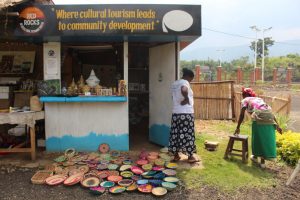
Born in a refugee camp in Western Uganda, Bakunzi was forced to drop out of school in seventh grade due to lack of funding. In 1994, he was presented the opportunity to visit Mgahinga National Park in Uganda where he saw mountain gorillas for the first time. Having a tough start to life in the refugee camp, he felt moved by the experience.
Later that year, he traveled to Rwanda for the first time and was struck by the beauty of the landscape. Though only a teenager, he had no idea these two fateful excursions would lead to his career in tourism.
The following year, a tour operator friend began to send him tourists interested in visiting Rwanda and all of a sudden, he became a tour guide. After five or so years of guiding, Bakunzi began to wonder if he could start his own tour company.
Thanks to the encouragement from one particular client, Bakunzi launched a company called Amahoro Tours in 2008. Its success inspired him to continue creating more businesses, leading to the opening of Red Rocks Rwanda in 2011.
Located in Nyakinama Village, in the Northern Province, near the Uganda and Democratic Republic of Congo borders, Red Rocks Rwanda is a budget backpacker hostel, campsite, and cultural center. A two-hour drive down a paved and winding road from the capital city Kigali, the hostel is located in a lush green valley with views of prominent peaks that make up the Virunga mountain chain. The main attractions in the region are Mgahinga Gorilla National Park in Uganda and Volcanoes National Park.
While Red Rocks does offer ecotours to see the gorillas and the volcanoes, the hostel serves an important role in the economic vitality of the community.
“My main motivation in starting Red Rocks was to demonstrate that there is much more to offer tourists in Rwanda beyond the gorillas,” Bakunzi said. “Our focus from the start was community-based tourism from which tourists could learn more about the country’s history, culture, and traditions by taking them closer to the ordinary Rwandan.”

Committed to responsible tourism, Red Rocks offers a wide array of experiential cultural, family-friendly, and outdoor activities that always put the community first. Red Rocks works with the local people to help them learn to become entrepreneurs and use their knowledge to boost their socio-economic status by directly selling their crafts and skills to the guests staying at the hostel.
In addition to multi-day cross-border adventures to see the gorillas and tour the volcanoes, visitors can choose from a number of cultural activities, including banana beer production and tasting, agricultural tours, traditional dancing and drumming performances, painting, and local home stays, complete with traditional cooking lessons from the hosts.
Family groups can participate in bonfire storytelling sessions that reveal rich oral traditions, legends, and customs, movie nights that highlight community conservation efforts, and success stories from Volcanoes National Park. Zulu, the artist in residence at the Red Rocks Art Center entertains guests with painting lessons for kids and adults alike. For those who prefer to be more active, the wooden bike tour visits the local village market and exemplifies how Rwandans traveled prior to the invention of motorized transportation.
One particular project of which Bukunzi is most fond is the Agaseke Craft Cooperative. The cooperative features basket weaving crafts made by underprivileged women from the nearby community. The women earn a living by selling their colorful baskets to tourists and by teaching interested guests how to weave.
Red Rocks strives to utilize the local agriculture, art, and personnel in his business. The food, like the sorghum and bananas used to make the banana beer come from local farmers. The women in the basket weaving cooperative sell their products directly to the tourists. The art on the walls is created by local artists. Every aspect of the hostel seeks to benefit the local people.

Bazunki says that the key to creating a sustainable community with the local people is to build quality relationships and sponsor long-term viable projects that have the support of the staff and guests. Each project seeks input from the entire community in order to ensure their needs are being met.
He advocates the importance of teaching local communities the value of not only tourism, but of self sufficiency. He approaches his own work with the community with the idea of teaching a man to fish.
“When we arrange local home stays, the tourists pay directly to the host families. When we organize local agricultural tours and other activities like the village Christmas market, tourists get to buy fresh farm produce directly from local farmers,” he explains. “Basically we facilitate fair trade between tourists and the locals by creating projects through which the local community can tap into the tourist dollar.”
The arrival of Red Rocks has fostered an entirely new way of thinking for the local people, both in terms of conservation and in earning a living. Equipped with a general understanding of business and the realization that they possess skills that interest foreign visitors, the region serves as an uplifting example of sustainable tourism.
Learn more about how Red Rocks is supporting communities affected by COVID-19 here.
